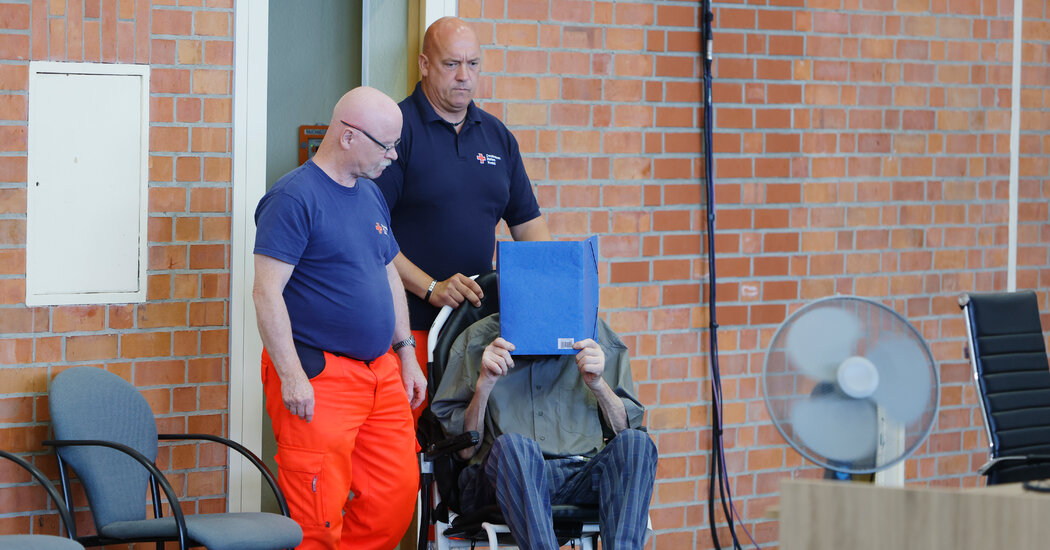
BERLIN — A 101-year-old former concentration camp guard was convicted by a German court on Tuesday of being an accessory to more than 3,500 murders and sentenced to five years in prison, although it was not clear whether he would ever serve time.
The man, who has been widely described in the German media as the oldest person ever to be tried on Nazi-era charges, worked as an SS guard at the Sachsenhausen concentration camp, north of Berlin, from 1942 to 1945. He denied working at the camp, and prosecutors were unable to directly link him to the deaths of the prisoners.
Reading out the verdict just after 10 a.m., Judge Udo Lechtermann said that the man had supported the Nazi system of terror and murder. “You have willingly supported this mass destruction with your activities,” he said.
A lawyer for the man, identified only as Josef S. because of Germany’s strict privacy laws, said he would appeal the decision if the authorities follow though and try to send him to prison. That move would also require a declaration by a medical commission saying that his health was stable enough for confinement.
“We go by the simple principle that murder does not have a statute of limitations,” said Thomas Will, who leads the German government office tasked with investigating Nazi-era crimes. The office found Mr. S. in 2018 after scouring concentration camp records that the Red Army had taken back to Moscow. “It is what’s right, and of course it would have been what was right 70 years ago.”
As the perpetrators of the Holocaust grow increasingly few and old, German prosecutors and investigators are racing to bring remaining cases to court.
Their efforts have been bolstered by a 2016 ruling from Germany’s highest criminal court that confirmed an earlier conviction of Oskar Gröning — nicknamed the bookkeeper of Auschwitz — that held that people who worked as staff members in concentration camps could be convicted, even if no specific crimes against them could be proven. It followed an earlier ruling in 2011 by a Munich court against John Demjanjuk, an autoworker who was deported to Germany from the United States to face trial, despite the fact he was a low-ranking guard.
That ruling gave prosecutors an easier path to pursue suspected war criminals, because for decades, merely being a cog in the Nazi machinery was considered insufficient grounds to secure a conviction.
A 97-year-old woman is currently on trial in the northern town of Itzehoe, accused of war crimes at Stutthof concentration camp, close to what is currently the Polish city of Gdansk.
And there are at least other six cases across Germany that state prosecutors are investigating with a view to indictment, Mr. Will said.
“Many people, the perpetrators of suffering and death in the concentration camp system created by Nazi Germany, avoided responsibility immediately after the war for various reasons,” said Piotr M. A. Cywinski, the director of the Auschwitz Memorial, in an emailed statement.
“This verdict of the court has of course its symbolic significance, not only to the memory of the victims of KL Sachsenhausen and their relatives,” Mr. Cywinski said. “It is also a clear signal that crimes against humanity are not subjected to the statute of limitations.”
Given the defendant’s age, the trial was moved to a community gymnasium in Brandenburg an der Havel, close to where he lives. The hearings took place only twice a week and for only hours at a time, with medics on standby.
Mr. S., an ethnic German born in Lithuania, refused to acknowledge even working as a guard, instead claiming that he worked as a farm hand during the time in question. “I don’t even know what I am supposed to have done,” Mr. S. said to the judge during closing arguments on Monday. “I have nothing to do with it.”
The prosecution could prove that Mr. S. had joined the SS just before his 21st birthday. He not only served as a guard at Sachsenhausen, prosecutors said, but had managed to get promoted to Rottenführer, the highest rank for enlisted men in the SS.
Questions around whether to incarcerate extremely old war criminals came up in 2015 when Mr. Gröning went to the highest German court to try to stay out of prison despite a conviction. The court ruled that as long as his health allowed it, Mr. Gröning would have to serve time. But Mr. Gröning died before he could ever see the inside of a prison.
Mr. S. would likely wait months before a higher court would hear his appeal, making it very unlikely that the 101-year-old would face real prison time.
Still, Mr. Will, the state prosecutor in charge of investigating these crimes, says securing these convictions is extremely important, even if they are delayed.
“How can you explain to anyone that someone who serves in a concentration camp for three years, where people are gassed and shot, is not guilty of aiding and abetting murder,” he said.
A number of witnesses to the crimes committed at Sachsenhausen attended the trial as co-plaintiffs in the case. One of the witnesses was Leon Schwarzbaum, a concentration camp survivor who was transferred to Sachsenhausen from Poland in the early months of 1945, when the Red Army started liberating camps in the east.
“I am one of the last Auschwitz prisoners,” Mr. Schwarzbaum told reporters in October, just five months before dying aged 101.
“I want that if this man is convicted — and hopefully he will be convicted — he goes to prison,” he said.




